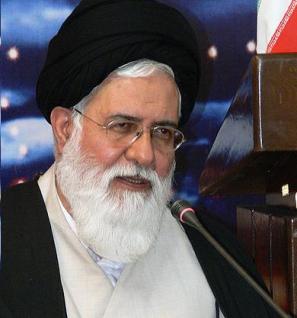
Rasa News Agency reports - Ayatollah Sayyed Ahmad AlamolHoda, the Friday prayers leader of Mashhad, spoke on the occasion marking the 40th day after the martyrdom of Ali Khalili at Hadhrat Abul-Fadhl al-Abbas (A) Mosque about the importance of enjoining the good and forbidding the wrong.
He pointed to the verse of the Holy Quran which states:
“But the faithful, men and women, are guardians of one another: they enjoin what is right and forbid what is wrong and maintain the prayer, give the poor-rate, and obey God and His Apostle. It is they to whom God will soon grant His mercy. Indeed God is all-mighty, all-wise.” [9:71].
He explained that the guardian mentioned in this verse is the ruler of an Islamic society, who must rule by the Islamic concept of enjoining the good and forbidding the wrong. Some people in society are guardians because they fulfill their duties to encourage others to enjoin the good and forbid the wrong.
Guardianship in Islam is based on a democratic viewpoint in which good social relations between Muslims are encouraged, such as unity between the various Islamic schools of thought as a buffer against those who attempt to create disunity. Thus, guardianship is a type of social order, in which the guardian encourages people towards obedience to God and to enjoin the good and forbid the wrong.
“A religious society is unfathomable without the encouragement of enjoining the good and forbidding the wrong. The entire religious society is in relation to this concept. If we cannot form this type of [Islamic] culture in society, than we have failed to institutionalize Islam,” Ayatollah AlamolHoda explained.
“Religious relationships are formed when people pay attention to each others’ actions and behaviours which create deviation,” His Eminence explained.
“Treating those who do not behave in a proper Islamic way with rudeness and harshness, and judging them unfairly, shows a lack of the culture and a misunderstanding of the concept of enjoining the good and forbidding the wrong in society,” Ayatollah AlamolHoda said in regards to the correct methods of encouraging others to do good deeds and avoid doing harmful ones.
“Since the Islamic Revolution, many cultural projects and programs meant to encourage enjoining the good and forbidding the wrong have been planned but they have not been very successful because proper cultural building was not implemented first,” he warned.
“Our problem is not due to our methods of teaching or enforcing these concepts. If the offender understood that he was offending others, he would never repeat his offence again,” Ayatollah AlamolHoda stated.
“Creating a ministry to enforce enjoining the good and forbidding the wrong is a serious demand as it would guide offenders faster than punishment by the police does,” he suggested.
111/112